Katja, Margherita and Alison, key members or the division of Politics and History, discuss findings from their research below:

How do people power movements succeed when modest proportions of the population participate? In my latest study with Erica Chenoweth (Harvard University) we evaluate the proposition that the accumulation of force for social movements approximates a simple law drawn from physics: force equals mass times acceleration (f=ma). Our study propose that the force of dissent is a product of participation (mass) and diminishing temporal distance between protest events (acceleration). I test this simple physical proposition against panel data on the effects of mass and acceleration of protest events on irregular leader exit in African countries between 1900-2014 using a variety of estimation techniques. The findings show that social movements can often compensate for relatively modest popular support by concentrating their activities in time, thereby increasing their disruptive potential. Crucially, these findings also provide a novel way for dissidents to easily quantify their coercive potential by assessing their participation rates and increased concentration of their activities in time.
Where do our ideas about borders come from? How have our attitudes towards border crossings changed over time? Who decides what role border infrastructure should play in channelling or preventing crossings? In 2018 I am beginning a new research project that addresses these questions. Funded by Brunel University London’s Athena Swan Award scheme (which supports staff who are returning from a period of maternity leave), I will be working on a history of the Franco-British border focussed upon the Channel Tunnel.
The starting point of this project is that while borders represent powerful symbols of national identity and historical continuity, they are neither eternal nor constant. They have been imagined and reimagined in a variety of ways, and have functioned differently across time periods and political regimes. Through a history of the Channel Tunnel, this project investigates changing understandings of the Franco-British border from the first proposal for a tunnel in 1802 to its opening in 1994. During this period, a tunnel was periodically proposed and resisted, reflecting evolving domestic and international concerns, as well as shifting Franco-British relations. This history was not linear. Indeed, the contingency involved in the Tunnel’s imagining at particular moments tells us much about evolving state preoccupations. As a result, discussions over the Tunnel offer insight into France and Britain’s assumptions and insecurities during a period of changing understandings of international cooperation, but also of increased state efforts to monitor, control and police national boundaries.
I started thinking about this project when I visited Brunel’s Special Collections as part of my teaching on Historians and their Craft. When I was there, I found out that they hold the archive of the Channel Tunnel Association. My last project on the return of Alsace to France in 1918 gave me an interest in how borders have shaped and reflected broader processes of historical change, and I began to think about working through this archive. Since that first visit, a history of the Channel Tunnel has seemed ever more timely and important. The Brexit negotiations and refugee crisis have focused very much upon the closure of European borders, and as the Channel Tunnel is the only British land border with the European continent it has adopted a pivotal role in these discussions. So, I hope that this project will help us to position contemporary debates within the longer flow of historic negotiations.
Over the coming year, the Athena award will give me the time to visit archives in France and in Britain, including Brunel Special Collections, the National Archives in Kew, Archives Nationales in Paris, and local archives in Kent and Pas-de-Calais to trace this history. I plan to use state archives as well as those produced by civil society in order to show the range of interests that have shaped the Tunnel’s history. My work on Alsace showed me that borders are not simply imposed from above by governments, but rather formed in conversation with a range of interest groups. So, using state and civil society archives in both nations will allow me to consider how ideas about borders developed and shaped plans for the Tunnel in France and Britain. After spending time in the archives I will be writing a series of articles based on my findings, and I hope that they will shed new light on how France and Britain have negotiated and imagined their shared borde

This research project tests a new theory of cross-border integration through the collection and analysis of Polish opinion poll data. The key proposition is that contextual factors – such as the cultural similarity of neighbouring countries or divergent levels of development – affect whether individual cross-border contact experiences lead to the development of trust in neighbouring nations.
Even though the ongoing migration crisis and the Paris attacks have challenged open borders in the EU, European border regions remain sites of high cross-border interaction density. Current theorising on borders suggests that such interactions stimulate trust in, and favourable perceptions of, neighbouring nations. However, these theories have so far focused exclusively on the individual level, whereas contextual factors such as a border’s particular history or economic pull-factors are likely to influence individual experiences.
This research project is one of the first to integrate individual-level and contextual factors into a new theory of cross-border integration. It involves conducting an opinion poll in Poland, measuring where in Poland respondents live, how much contact they have had with neighbouring nations, and their perceptions of members of these neighbouring nations. Poland is an excellent test case because it offers much variation in terms of geographical context. The focus is on four of Poland’s neighbouring countries, namely the Czech Republic, Germany, Lithuania, and Ukraine. The opinion poll was conducted by Ipsos Poland, through 1,500 computer-assisted face-to-face interviews.
The research is supported by the British Academy and by Brunel University, through a BRIEF award as well as an Athena Swan award.